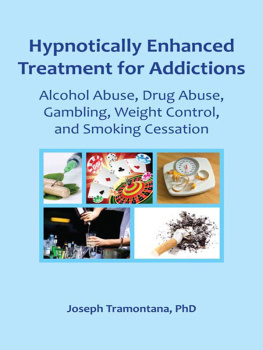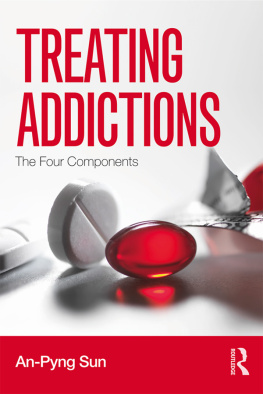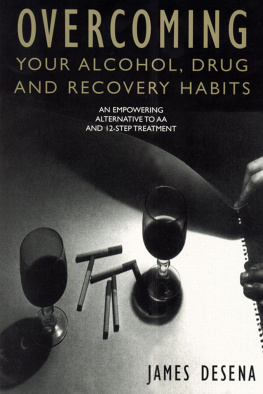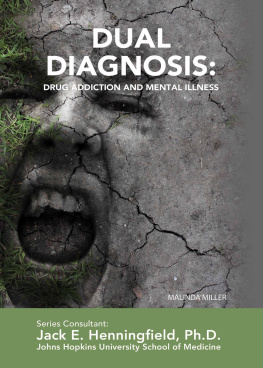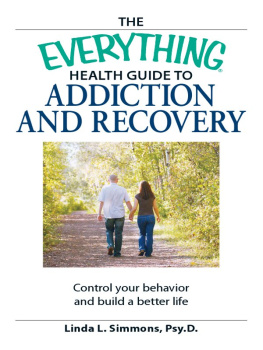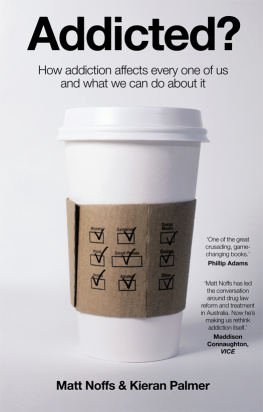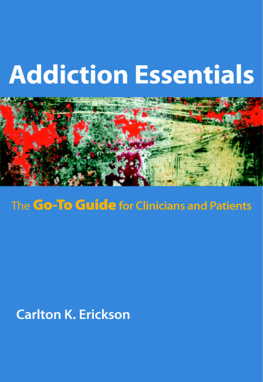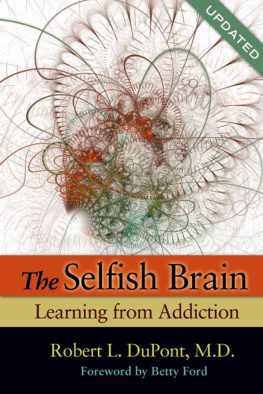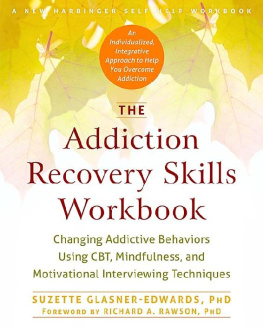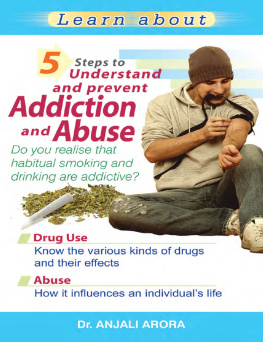Hypnotically
Enhanced
Treatment for
Addictions
Alcohol Abuse, Drug Abuse,
Gambling, Weight Control,
and Smoking Cessation
Joseph Tramontana, Ph.D.

Crown Housing Publishing Limited
www.crownhouse.co.uk
www.crownhousepublishing.com
First published by
Crown House Publishing Ltd
Crown Buildings, Bancyfelin, Carmarthen, Wales, SA33 5ND, UK
www.crownhouse.co.uk
and
Crown House Publishing Company LLC
6 Trowbridge Drive, Suite 5, Bethel, CT 06801-2858, USA
www.crownhousepublishing.com
Joseph Tramontana 2009
The right of Joseph Tramontana to be identified as the author of this work has been asserted by him in accordance with the Copyright, Designs and Patents Act 1988.
All rights reserved. Except as permitted under current legislation, no part of this work may be photocopied, stored in a retrieval system, published, performed in public, adapted, broadcast, transmitted, recorded or reproduced in any form or by any means, without the prior permission of the copyright owners.
Enquiries should be addressed to
Crown House Publishing LLC.
British Library Cataloguing-in-Publication Data
A catalogue entry for this book is available
from the British Library.
13 Digit ISBN 978-098235736-1
eBook ISBN 978-184590422-7
LCCN 2009927264
Printed and bound in the USA
Dedicated to My Loving Wife, Lynn,
and my Children, Jim and Jody,
of whom I am so proud.
Acknowledgments
To my clinical assistant, Traci Olivier, without whose meticulous editing and assistance with the technical aspects of constructing the manuscript, I would have been figuratively up the creek without a paddle.
I also wish to take this opportunity to thank the American Society for Clinical Hypnosis (ASCH) for the excellent training opportunities which allowed me, first of all, to gain the confidence to incorporate hypnosis into my clinical practice. Thanks to all of the ASCH presenters and faculty over the years who have expanded and fine-tuned my clinical hypnosis horizons. Finally, thanks to ASCH for allowing me to become a faculty member and present the materials in this manuscript at the 2009 ASCH Conference and Workshops.
Contents
Introduction
In a recent article entitled The Science of Addiction, Lemonick and Park (2007) noted that 18.7 million Americans, or 7.7% of the population, are dependent on or abuse alcohol. They reported an estimate of 2 million members in Alcoholics Anonymous. They estimated that 3.6 million people are dependent on drugs, and approximately 700,000 are undergoing treatment for addiction. They estimated 71.5 million users of tobacco products, including about 23.4% of men and 18.5% of women who smoke cigarettes. The article stated that 2 million American adults (0.67% of the population) are reportedly thought to be pathological gamblers, and that 4 million adults are addicted to food, with about 15% of mildly obese people being compulsive eaters.
I have been treating smokers and weight loss clients with hypnotherapeutic interventions since shortly after my first ASCH workshop in 1978, and at some point thereafter began using hypnosis as an adjunctive technique with alcohol, drug abuse, and compulsive gambling. Over the years, I have been acutely aware of the lack of literature regarding hypnotherapy with the latter three addictions. My focus is on patients who call or show up at an outpatient office requesting treatment for previously untreated or ineffectually treated alcohol, drug, or gambling addiction, in addition to smokers or those interested in weight loss.
What is the reason behind the dearth of literature and training opportunities on treatment of alcohol, drug and gambling addictions via hypnotherapy? There are likely several. Perhaps it is because hypnotherapists are reluctant to step on the feet of programs/philosophies such as Alcoholics Anonymous, Narcotics Anonymous, or Gamblers Anonymous. Perhaps it was because Milton Erickson (Erickson, 1976), who is so highly revered in the hypnosis field, stated that hypnosis was not a good approach for alcoholics because hypnosis encouraged: (1) an unhealthy negative transference, and (2) dependence on the therapist. One might find this quote strange in light of the fact that Haley (1985) reported conversations with Erickson in 1957 regarding several cases in which he successfully treated alcoholics. Of course, he was using what he referred to as a strategic therapy approach rather than formal hypnotherapy. In Rossis (1980) four volumes on The Collected Papers of Milton H. Erickson on Hypnosis, there are absolutely no references in any of the four subject indexes on alcohol abuse, drug abuse, or gambling.
All of this is to say that the purpose of this book is, therefore, to offer new strategies, techniques, and scripts for use with problem drinkers, alcoholism, drug addiction, and gambling addiction in an outpatient population, as well as to review old and to present new techniques or combinations of techniques, strategies, and scripts for other addictions. The five addictions to be addressed are: alcohol abuse and dependency, drug abuse/addiction, gambling compulsions/obsessions and addictions, tobacco addiction (including cigars, pipes and chew), food addiction/compulsions. In the latter two, the strategies and techniques section will also address marketing and/or providing a package of sessions, with various preplanned scripts used in each session.
The title includes the term hypnotically enhanced versus hypnotherapy because, as the reader will note, many of the techniques and strategies incorporate a variety of therapeutic modalities, including: cognitive-behavioral techniques (Meichenbaum, 1977; Zarren & Eimer, 2002), solution-focused brief therapy (de Shazer, 1988), reframing and other NLP techniques (Grinder & Bandler, 1976), systematic desensitization, covert sensitization, techniques from the literature on healing the wounded child within (see Whitfield, 1987), 12-Step programs, guided imagery and meditation, among others. Furthermore, the techniques are employed both in and out of trance.
In the chapters on alcohol, drugs, and gambling, the reader will note that in not all of the sessions will hypnotic states even be induced or elicited. In the chapters on smoking cessation and weight loss, the time- or session-limited structure of the program will incorporate hypnosis into each session.
Additional points of note have to do with hypnotic states versus trance and elicitation versus induction. Although the author may at times utilize the terms trance or induction loosely, hypnotic state and elicitation are preferred, for similar reasons. From an anthropological perspective, DePiano (2004) stated that trance could imply both possession trance in which someone loses conscious awareness and an invading spirit takes over with its own behavior, speech patterns; and body movements or trance, a so-called altered state of consciousness including the loss of conscious awareness but without the presence of a spirit or other outside entity. He adds that since a hypnotic practitioner is not an intrusive spirit or a sorcerer (I like to add, At least, most of us arent), it makes more sense to talk about the hypnotic condition, hypnotic situation, hypnotic process, or the hypnotic experience than about the hypnotic trance. I prefer the hypnotic state. So while I may occasionally call it a trance, the goal is for patients to feel comfortable with the idea that hypnosis does not involve my controlling them, but rather that I will be teaching them to control themselves. So after considerable discussion of what hypnosis is and what its not, the term hypnotic state seems preferable.

